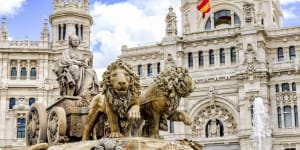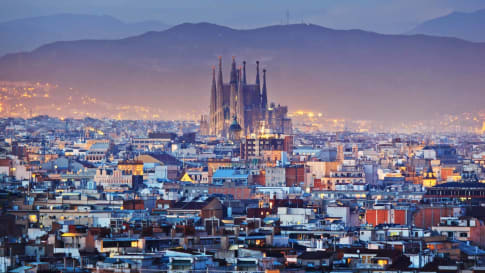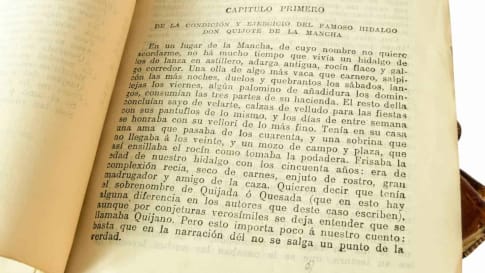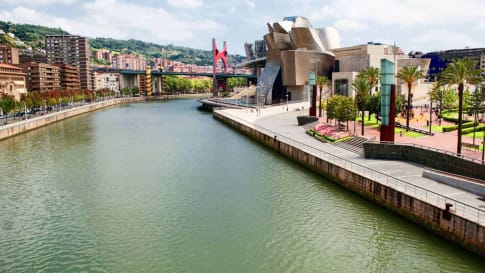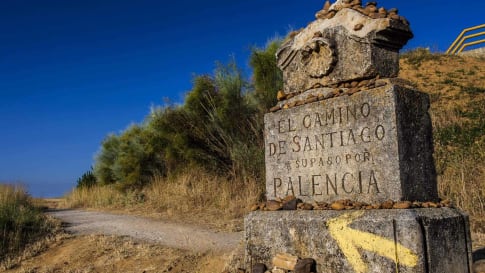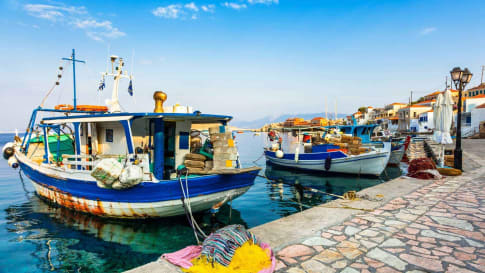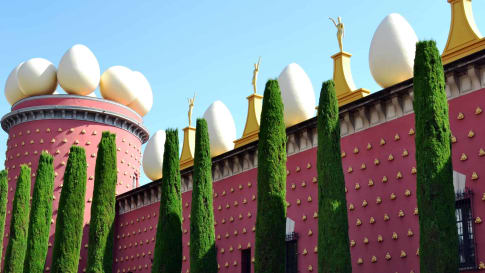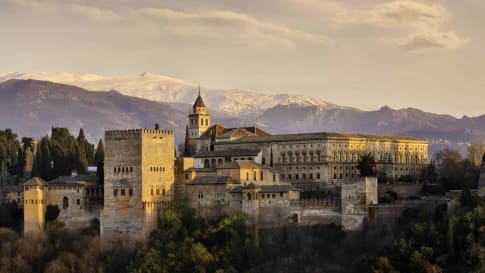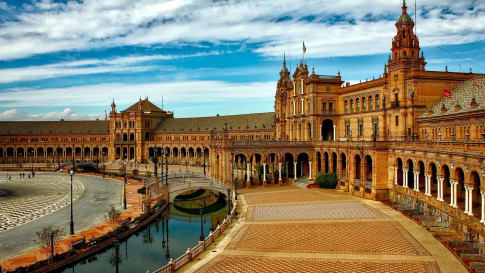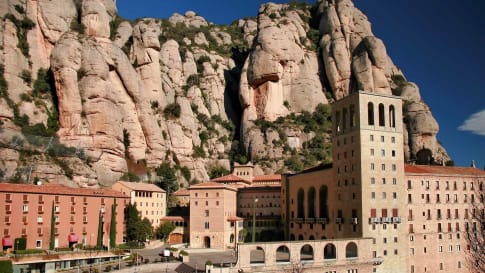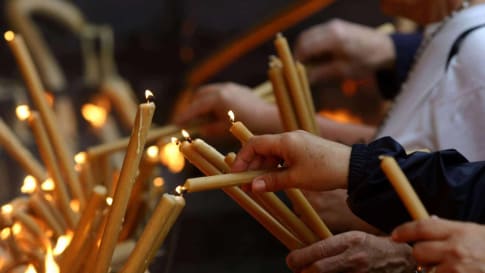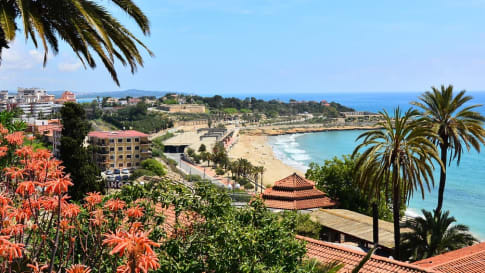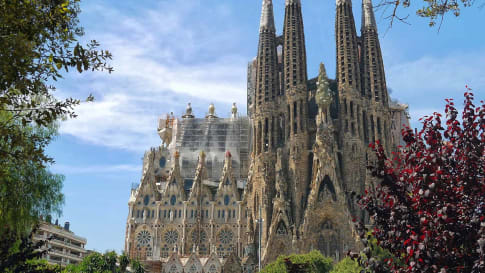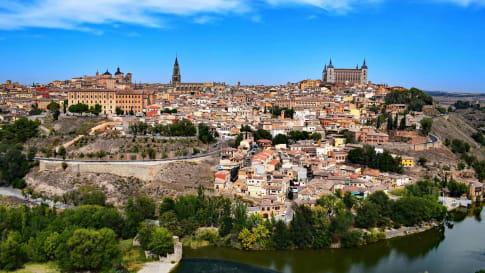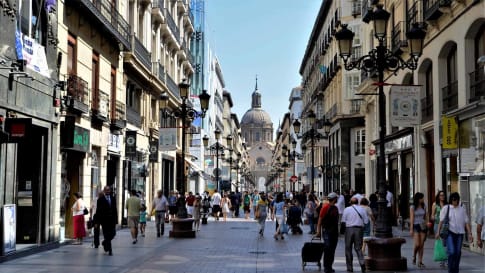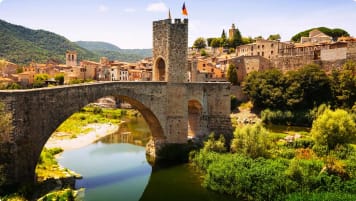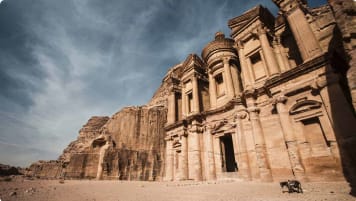Short Spain Tour for senior and mature travellers
Join our small group guided tour of Spain, exploring this fascinating country over 10 nights with like minded people. We start in Barcelona and make our way slowly towards Madrid. Enjoy the food and culture while learning about the history of each location from our expert local guides and Odyssey Program Leader.
From €4,877EUR
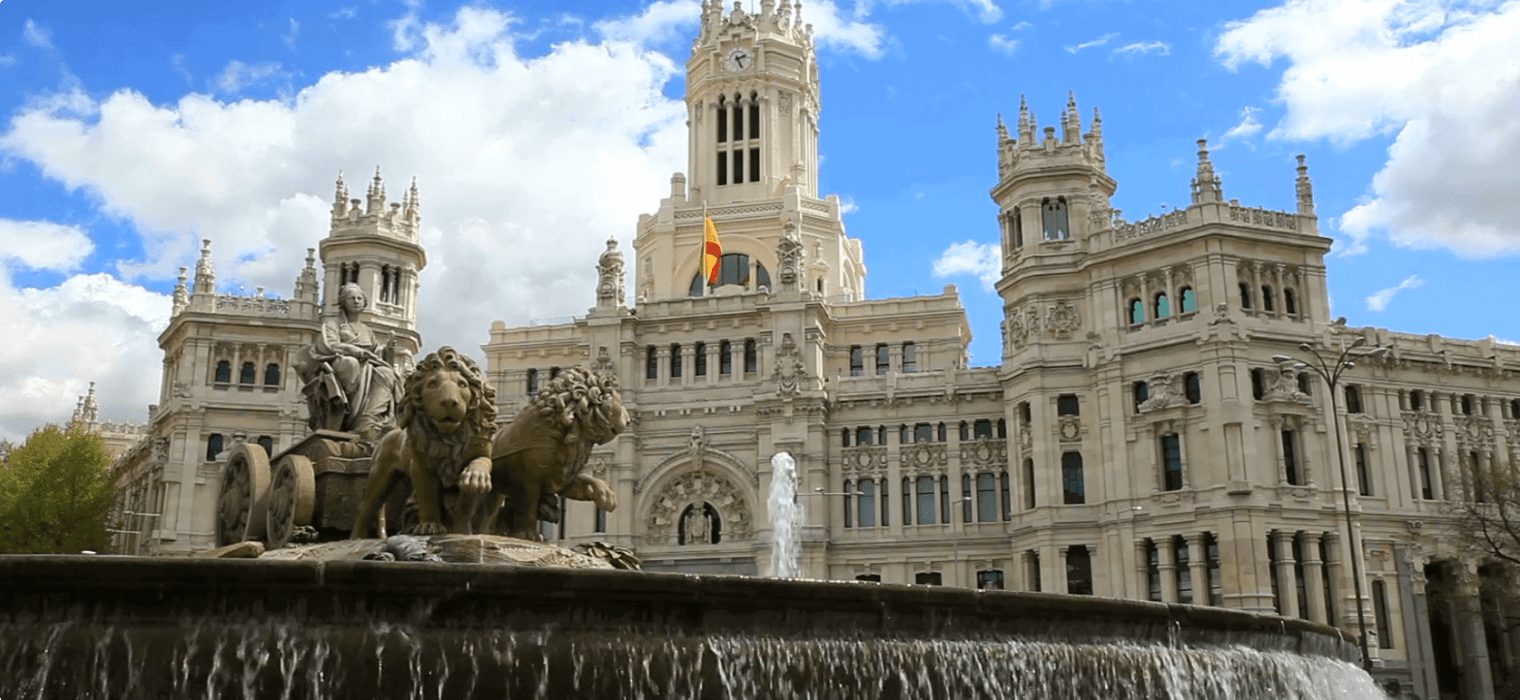
Highlights
- 1. Marvel at Madrid and the architectural splendours of the Catalan Barcelona.
- 2. Experience La Rioja, the mountain kingdom of Navarra, and neighbouring Basque Country with its astounding Guggenheim Museum.
- 3. Explore the history of Iberia and its measured way of life.
- 4. Sample the famous red wines of Spain and enjoy the rich texture of its street life.
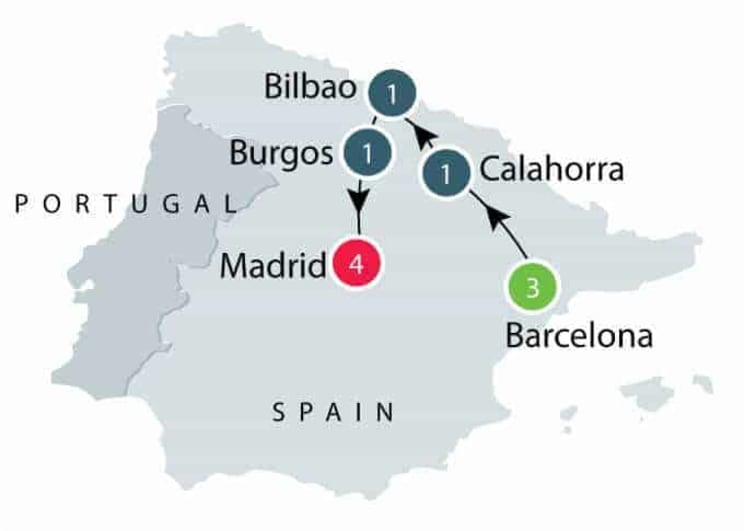
Departure Dates
| Departure Date | Price |
|---|---|
| 01 October 2025 Ends 11 October 2025 • 11 days €4,877 Twin €5,448 Single Available | Selected |
| 31 March 2026 Ends 10 April 2026 • 11 days €5,460 Twin €6,153 Single Available | |
| 07 October 2026 Ends 17 October 2026 • 11 days €5,460 Twin €6,153 Single Available | |
| 30 March 2027 Ends 09 April 2027 • days €5,708 Twin €6,440 Single Available | |
| 06 October 2027 Ends 16 October 2027 • days €5,708 Twin €6,440 Single Available |
Spain Short Tour | Small Group Tours Spain
Enjoy this short tour of Spain designed for mature travellers. This unique travel experience gives you the opportunity to discover Iberia in an escorted small group program. Experience a country with a rich history, diverse culture and delicious food. Once a formidable and mighty empire, Spain had access to great wealth and used this to create many of the monuments, structures and heritage sites we admire today.
The Iberian Peninsula in particular is renowned for its red wine, exotic cuisine and bustling street life. Starting in the vibrant beach-side city of Barcelona, we will travel through northern Spain into Rioja and Basque country before visiting the industrial city of Bilbao. After Bilbao we head back down to Spain's incredible capital Madrid, where we get a chance to see how Spain has contributed to the world of art.
Highlights of this short tour of Spain
The small group short tour to Spain is fully escorted and makes great use of local guides whose knowledge enhances the program. Some highlights you can expect from this vacation include a visit to La Rioja, an autonomous community in the north of Spain famed for its red wine and vast blue skies, the incredible Guggenheim Museum in Bilbao, and the Royal Palace in Madrid. This will offer you everything you could want in a small group holiday, from the chance to sip red wine against a rugged, mountainous backdrop, to eating tapas in the bars of Barcelona, to exploring some of Madrid's amazing churches and learning of its complex religious history.
We will spend nights in the following cities:
Barcelona
The entrancing cosmopolitan city of Barcelona is one of the cultural highlights of Europe. Situated on the Mediterranean coast of the Iberian Peninsula, the Catalan capital is famous for its distinctive architecture and its world-renowned food and wine. It was believed to have been founded by either the Phoenicians or Carthaginians. Under the Romans, it was known as “Colonia Faventia Julia Augusta Pia Barcino” or Barcino, which gained importance around the 3rd century AD. Towards the end of the 1800s, an avant-garde style of music, literature, art and architecture evolved in Barcelona, which led to a regional artistic and linguistic renaissance. This cultural re-birth went on to become a means of expression for Catalan nationalism. The major exponent of this ‘modernism’ in architecture was Antoni Gaudí, whose buildings and monuments have left an indelible mark on the city.
Madrid
Madrid, the capital of Spain, is situated in the geographical centre of the peninsula, on the Meseta Castellana, the Castilian Plateau, around 700 metres above sea level. With its more than three million inhabitants and another two million in its surrounding Comunidad de Madrid, it is indeed one of the liveliest and most exciting cities in Europe. Madrid has been inhabited since the Stone Age, but it developed as a medina (Arab town) in the 9th century, growing around the alcazar or castle overlooking the Manzanares River. It was eventually captured from the Muslims by Alfonso VI of Castile and Leon in 1083. Many kings spent time in this city, and in 1309, the Cortes, precursor to the Spanish Parliament, was first called in Madrid.
The last king of Spain to live in Madrid's Royal Palace was Alfonso XIII, who abdicated the throne in 1931 following a municipal plebiscite that abolished the monarchy. The Spanish Constitution of 1931, calling for the democratic election of Spain’s rulers, was legislated in Madrid. The Spanish Civil War broke out in 1936, and Madrid, a bastion of the Republican forces, was besieged and bombed by Franco’s Nationalist forces. The Nationalist forces were supported by Fascist Italy and Nazi Germany, and Madrid eventually fell in March 1939.
Following Franco’s death and the end of his dictatorship in 1975, Madrid was confirmed as Spanish capital in the 1978 constitution. The 1978 constitution also established the Spanish government as a parliamentary monarchy, with the monarch as head of state and the prime minister as head of government.
Bilbao
In the heart of Basque Country, 11 km from the Bay of Biscay, you will find Bilbao, one of northern Spain’s greatest treasures. Renowned for its famous Guggenheim Museum, Bilbao’s architectural wonders are surrounded by a ring of rolling green hills and lies on the mouth of the Nervion River. Once an industrial city, it has been transformed into a design city, where sleek new buildings sit alongside Gothic cathedrals and art nouveau train stations. At the end of 2017, Bilbao was chosen the Best European City 2018 at The Urbanism Awards 2018 and it is not hard to see why, with a new rapid transit system, a tram line and the Azkuna Zentroa, a wine storage warehouse turned cultural centre. This Spanish city has it all: vibrant history and culture, modern architecture, beautiful scenery and spectacular regional cuisine.
Calahorra
Calahorra is a town in the La Rioja region of northern Spain that has been inhabited since the Paleolithic. As the Roman town Calagurris (later Calagurris Nassica), it became an important administrative centre for surrounding regions. The town famously resisted the general Pompey—who was part of Caesar’s First Triumvirate and married to Caesar’s daughter, Julia—supporting instead his rival Quintus Sertorius, leader of the revolt against Rome. Calahorra supported Sertorius for four years until it suffered from starvation and fell to Pompey’s legate. This small town has historic landmarks dating from this era, such as ruins of a Roman aqueduct, as well as a 5th-century Gothic Cathedral, and the Casa Santa, said to house the bodies of the town’s patron saints (Emeterius and Celedonius), making it a pilgrimage site every August.
Burgos
The medieval town of Burgos served as an important commercial centre and capital of the unified kingdoms of Castile and Leon for five centuries. The city’s significance in the Middle Ages can be seen in its lush architecture and notable pieces of art. The Burgos Cathedral, constructed from 1221 to 1567, is hailed as a comprehensive example of the evolution of Gothic architecture, leading to its being listed by UNESCO as a World Heritage Site. Another important Gothic landmark is the 15th century Cartuja de Milaflores (Milaflores Charterhouse), once the recreational residence of Henry III of Spain, restored by his son John II with the help of Spain’s top architects, sculptures, and painters.
This Spain Short Tour is limited to 14 travellers. This tour is featured in our brochure as "Discovering Iberia - Short Tour". Odyssey offers a long version of the program that includes Portugal and southern Spain as well.
You can learn more about Spain and see all other tour departures on our country profile. For more details on this tour, click the ‘Top 5’ or ‘Itinerary’ buttons above! If you’re keen to experience this tour, please call or send an email. Or, to book, simply fill in the form on the right hand side of this page.
External & Internal Articles about Spain
The following list of articles are either published by Odyssey Traveller for mature aged and senior travellers or carefully selected from external sources to maximise their knowledge and enjoyment of Spain when visiting:
Gallery
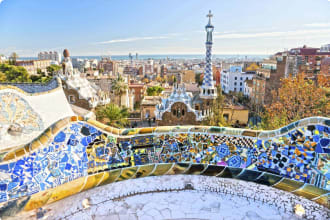

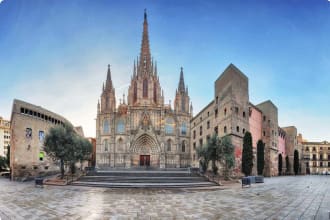
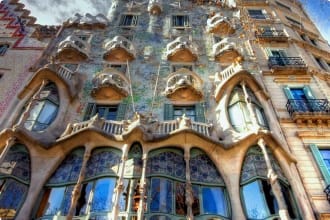
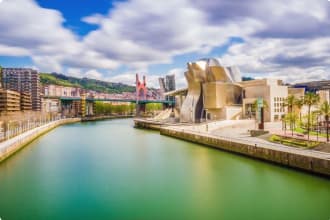
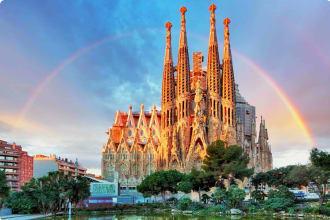
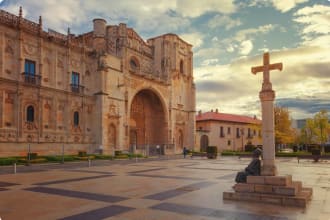
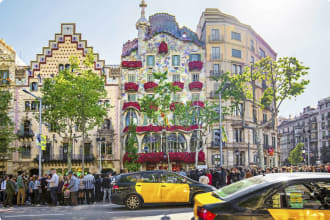
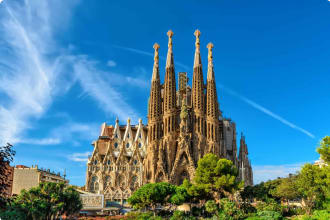
Itinerary
11 days
Day 1: Barcelona
Accommodation: 3 nights at Amister Hotel or similar.
Upon arrival in Barcelona, we will come to the hotel individually. Our tour begins with an orientation and welcome dinner.
Once part of the Aragonese Empire, Catalonia is now an autonomous Spanish province, proud of its distinctive language and culture. Stretching from the Mediterranean to the Pyrenees, it was here that the Romans first landed on the Iberian peninsula and founded a new “colonnia” on the site of a previous Carthaginian settlement, the area now forming Barcelona’s “Barri Gotic.” Catalonian heritage is a mixture of old and new as ancient churches and monuments vie for attention with the Modernist school of Gaudi and Dali. The Catalonian capital reflects this contrast with architecture ranging from its Gothic cathedral to Gaudi’s modernist Sagrada Familia.
(D)
Day 2: Barcelona
Accommodation: Amister Hotel or similar.
Today, we enjoy a full day tour around Barcelona, visiting the Miró Foundation, the National Museum of Catalan Art and Park Güell, a World Heritage Site since 1984. The evening is free to relax or to discover one of the many local restaurants for dinner. (B).
(B)
Day 3: Barcelona
Accommodation: Amister Hotel or similar.
Today we will continue to explore Barcelona. We will view the main sights of the city, walk along the Paseo de Gracia, and walk through the Barrio Gothic. Entrance to the Museum of Contemporary Art is included. We will have lunch individually, and afternoon touring takes us to the Pauau de La Musica Catalana, with a guided tour and entrance to Sagrada Familia cathedral.. Dinner tonight is at own arrangements.
(B)
Day 4: Barcelona - Calahorra
Accommodation: 1 night at Parador de Calahorra or similar.
In the morning we will visit the the Picasso Museum and then transfer to the train station where we will take the high speed train from Barcelona to Zaragoza. The journey takes approximately 2 hours. The remainder of the afternoon is at leisure and dinner is at our hotel this evening.
Zaragoza was founded by the Romans in 25 BC, features some of Spain’s best examples of Mudejar architecture.
(B,D)
Day 6: Bilbao - Burgos
Accommodation: 1 night at Meson del Cid or similar.
We will view the main sights of the port city of Bilbao with our guide, who will show us the city’s highlights. Today’s highlight is the amazing Guggenheim Museum, where we spend 2 to 3h viewing their collection of contemporary works of art. We will stop at Mercado de Ribera where we can get some lunch (own arrangements) before continuing on to Burgos. We arrive at our hotel in time for dinner.
(B,D)
Day 7: Burgos - Madrid
Accommodation: 4 nights at Quatro Puerta Del Sol or similar.
Today we will have a city tour of Burgos in the morning including entrance to the Cathedral. We will drive to Segovia with a stop for lunch in Santo Domingo de la Calzada, and view the Roman Aqueduct before continuing our journey to Madrid where we stay for 4 nights.
Madrid is the capital of Spain and Europe’s highest capital city, located close to the country’s geographical centre on the Castilian Plateau. With a population of over 3 million, it offers a rich treasure chest of Spain’s art and ancient monuments.
(B)
Day 8: Madrid
Accommodation: Quatro Puerta Del Sol or similar.
Today we have a full-day tour exploring the highlights of the city, including entrances to the Royal Palace and the Museo Reina Sofia, Spain’s national museum of 20th century art. Later in the evening, we will meet our local guide again for a Tapas tour to sample the local cuisine across a series of bars. After a post-dinner walk to Mercado San Miguel we return to our hotel.
(B,D)
Day 9: Madrid
Accommodation: Quatro Puerta Del Sol or similar.
Today we will join our local guide to explore the nearby city of Toledo. We will visit the Synagogue de Santa Maria la Blanca, Sante Tome Church, the cathedral, and view the outside of Alcazar. Dinner this evening will be at a local restaurant.
(B,D)
Day 10: Madrid
Accommodation: Quatro Puerta Del Sol or similar.
In the morning we make our way to the Prado Museum and meet our local guide for a tour of the museum. The remainder of the day is free for you to continue to explore the city.
Day 11: Madrid
After breakfast, the tour will end.
(B)
Tour Notes
- Group size is limited to a maximum of 16 participants.
Includes / Excludes
What’s included in our Tour
- 10 nights of hotel accommodation.
- 9 breakfasts and 6 dinners.
- Transport and field trips as indicated.
- Applicable entry fees and services of local English speaking guides.
- Touring by comfortable and modern coach.
- Gratuities and necessary tips.
- Services of an Odyssey Tour Leader.
- Detailed tour information booklet.
What’s not included in our Tour
- Return international airfare and departure taxes.
- Comprehensive international travel insurance.
- Airport transfers.
- Items of a personal nature such as telephone calls and laundry.
Participants must be able to carry their own luggage, climb and descend stairs, be in good health, mobile and able to participate in 3-5 hours of physical activity per day, the equivalent of walking / hiking up to 8 kilometers per day on uneven ground.
Book now
Make it a private tour
Easing your journey
Crossing international borders with restrictions
The list of requirements to travel internationally has changed and will continue to change for several years. Odyssey is here to assist you in managing your way through these requirements:
For more information see our Crossing international borders with restrictions page.
Book With Confidence
If less than 30 days before your tour starts you are unable to travel as a result of Government travel restrictions, Odyssey Traveller will assist you with a date change, provide you with a credit or process a refund for your booking less any non-recoverable costs.
See Terms and conditions for details.
Peace of Mind Travel
The safety of our travellers, tour leader, local guide and support staff has always been our top priority and with the new guidelines for public health and safety for keeping safe for destinations around the world, we’ve developed our plan to give you peace of mind when travelling with us.
See Peace of Mind Travel for details.
Reviews
This was by far the ‘best’ Tour I’ve experienced both with Odyssey and with other companies – small, pleasant group etc. The tour guidelines, itinerary etc were the best I’ve had in comparison to other tours. I particularly liked the graph of the expected weather in Spain (makes packing easier). I’m a vegetarian and know that in a tour such as ours providing food for me can be fraught. Almost without exception the restaurant/hotel meals were worthy of a 5 star restaurant. My meals always met the five food group criteria and were beautifully presented – we even photographed some! The restaurants even managed vegetarian tapas! Carol T. May ’19
This was a wonderful tour, crammed with experiences of Spain, and all delivered apparently with the greatest ease. Well done! John M. May ’19
Great small mature travellers tour. Well organised, great hotels , lovely food, local knowledgeable guides showed us around their towns. With entry included to the majority of sites. A comfortable small coach so the fourteen of us had plenty of room but we weren’t in a massive coach. It wasn’t really like the other tours following someone with a flag. We were more like a group of friends out exploring. Lesley and Ken S. May ’19
I like Odyssey – it provides small groups where you can get to know one another. Angela L. Sep ’18
This tour was really wonderful in its scope of meeting Spanish culture and history. Being able to link it in with my previous European travels was very meaningful to me. I was totally impressed by every aspect of the tour. Participant May 2018
Cannot speak too highly of our tour director, Stephan De Roeck. Stephan’s local knowledge, command of the language, care for our welfare and unfailing good humour made everyone feel special. Participant May 2018
Reading List Download PDF
Spain: The Centre of the World 1519-1682
Robert Goodwin
n the sixteenth century, the Spaniards became the first nation in history to have worldwide reach; across most of Europe to the Americas, the Philippines, and India. Goodwin tells the story of Spain and the Spaniards, from great soldiers like the Duke of Alba to literary figures and artists such as El Greco, Velázquez, Cervantes, and Lope de Vega, and the monarchs who ruled over them.
At the beginning of the modern age, Spaniards were caught between the excitement of change and a medieval world of chivalry and religious orthodoxy, they experienced a turbulent existential angst that fueled an exceptional Golden Age, a fluorescence of art, literature, poetry, and which inspired new ideas about International Law, merchant banking, and economic and social theory.
Moorish Spain
Richard A. Fletcher
Written in the same tradition as John Julius Norwich's engrossing accounts of Venice and Byzantium, Richard Fletcher's Moorish Spain entertains even as it enlightens. He tells the story of a vital period in Spanish history which transformed the culture and society, not only of Spain, but of the rest of Europe as well. Moorish influence transformed the architecture, art, literature and learning, and Fletcher combines this analysis with a crisp account of the wars, politics and sociological changes of the time.
Beginning in the year 711 and continuing for nearly a thousand years, the Islamic presence survived in Spain, at times flourishing, and at other times dwindling into warring fiefdoms. But the culture and science thereby brought to Spain, including long-buried knowledge from Greece, largely forgotten during Europe’s Dark Ages, was to have an enduring impact on the country as it emerged into the modern era. In this gracefully written history, Richard Fletcher reveals the Moorish culture in all its fascinating disparity and gives us history at its best: here is vivid storytelling by a renowned scholar.
Ghosts of Spain: Travels Through a Country's Hidden Past
Giles Tremlett
The Spanish are reputed to be amongst Europe's most voluble people. So why have they kept silent about the terrors of the Spanish Civil War and the rule of dictator Generalissimo Francisco Franco?
The appearance - sixty years after that war ended - of mass graves containing victims of General Franco's death squads has finally broken what Spaniards call 'the pact of forgetting'. At this charged moment, Giles Tremlett embarked on a journey around Spain - and through Spanish history.
As well as a moving exploration of Spanish politics, Tremlett's journey was also an attempt to make sense of his personal experience of the Spanish. Why do they dislike authority figures, but are cowed by a doctor's white coat? How had women embraced feminism without men noticing? What binds gypsies, jails and flamenco? Why do the Spanish go to plastic surgeons, donate their organs, visit brothels or take cocaine more than other Europeans?
'Lively and well-informed . . . at once a history, a journalistic inquiry and a travel book.' Sunday Telegraph
Ghosts of Spain: Travels Through Spain and Its Silent Past
Giles Tremlett
"Part modern social history, part travelogue, Ghosts of Spain is held together by elegant first-person prose...an invaluable book...[that] has become something of a bible for those of us extranjeros who have chosen to live in Spain. A country finally facing its past could scarcely hope for a better, or more enamored, chronicler of its present."-Sarah Wildman, New York Times Book Review
The appearance, more than sixty years after the Spanish Civil War ended, of mass graves containing victims of Francisco Franco's death squads finally broke what Spaniards call "the pact of forgetting"-the unwritten understanding that their recent, painful past was best left unexplored. At this charged moment, Giles Tremlett embarked on a journey around the country and through its history to discover why some of Europe's most voluble people have kept silent so long. In elegant and passionate prose, Tremlett unveils the tinderbox of disagreements that mark the country today. Ghosts of Spain is a revelatory book about one of Europe's most exciting countries.
Iberia
James Michener
Spain is an immemorial land like no other, one that James A. Michener, the Pulitzer Prize–winning author and celebrated citizen of the world, came to love as his own. Iberia is Michener’s enduring nonfiction tribute to his cherished second home. In the fresh and vivid prose that is his trademark, he not only reveals the celebrated history of bullfighters and warrior kings, painters and processions, cathedrals and olive orchards, he also shares the intimate, often hidden country he came to know, where the congeniality of living souls is thrust against the dark weight of history. Wild, contradictory, passionately beautiful, this is Spain as experienced by a master writer.
Imperial Spain: 1469-1716
J. H. Elliott
Since its first publication, J. H. Elliott's classic chronicle has become established as the most comprehensive, balanced, and accessible account of the dramatic rise and fall of imperial Spain. Now with a new preface by the author, this brilliant study unveils how a barren, impoverished, and isolated country became the greatest power on earth—and just as quickly fell into decline.
At its greatest Spain was a master of Europe: its government was respected, its armies were feared, and its conquistadores carved out a vast empire. Yet this splendid power was rapidly to lose its impetus and creative dynamism. How did this happen in such a short space of time? Taking in rebellions, religious conflict and financial disaster, Elliott's masterly social and economic analysis studies the various factors that precipitated the end of an empire.
The Story of Spain: The Dramatic History of Europe's Most Fascinating Country
Mark R. Williams
The book is a popular history of Spain and the Spanish Empire from prehistoric times to the present day. It provides description and analysis of political, social, economic and cultural events over the centuries, which together shaped the history of this distinctive country. The book offers 60 illustrations and maps, including 16 pages of color photographs, as well as lists of historic places to visit at the end of each chapter. There is a dynastic chart, suggested readings, and index.
A Concise History of Spain
William D. Phillips Jr and Carla Rahn Phillips
The rich cultural and political life of Spain has emerged from its complex history, from the diversity of its peoples, and from continual contact with outside influences. This book traces that history from prehistoric times to the present, focusing particularly on culture, society, politics, and personalities. Written in an engaging style, it introduces readers to the key themes that have shaped Spain's history and culture. These include its varied landscapes and climates; the impact of waves of diverse human migrations; the importance of its location as a bridge between the Atlantic and the Mediterranean and Europe and Africa; and religion, particularly militant Catholic Christianity and its centuries of conflict with Islam and Protestantism, as well as debates over the place of the Church in modern Spain. Illustrations, maps, and a guide to further reading, major cultural figures, and places to see, make the history of this fascinating country come alive.
Spain: A Literary Companion
Jimmy Burns
Spain has one of the richest cultures in the world - and one that has inspired writers throughout history.
Anyone visiting the country will want to know more about its literary heritage.
Jimmy Burns's 'Spain: A Literary Companion' is the perfect travel partner, a book that will open your eyes and allow you to view the country afresh - and introduce you to aspects of Spanish life you never knew existed.
Part personal travelogue, part anthology, this literary companion will surprise, entertain and, on occasion, move the reader.
It is a wide-ranging and incisive portrait of a country and its people: starting with the Roman poets, it journeys through Cervantes to Orwell and Hemingway.
Highlights include: the enduring nature of regional identity; the joys - and pitfalls - of Spanish food and wine; tributes to Spain's three cultures - Christian, Jewish and Muslim; the passions of flamenco and bullfighting; battlefield experiences from Wellington to the Civil War; and the changes to the country wrought by tourism.
"A fascinating portrait of a country that writers have always loved' - Robert Avon, best-selling author of 'Diary of an Angel'.
Jimmy Burns is an award winning journalist and author. His books include the internationally acclaimed 'Hand of God: The Life of Diego Maradona' and 'Barca: A People's Passion'. Born in Madrid, he has reported for the Financial Times, London Observer, BBC and the Economist, and was the FT correspondent in South America in the early 80s and his book on Argentina and the Falklands War, 'The Land That Lost Its Heroes', won the 1988 Somerset Maugham Award for non-fiction.
A Short History of Spain
Mary Platt Parmele
The history of Spain dates back to the Early Middle Ages. In 1516, Habsburg Spain unified a number of disparate predecessor kingdoms; its modern form of a constitutional monarchy was introduced in 1813, and the current democratic constitution dates to 1978. After the completion of the Reconquista, the kingdoms of Spain were united under Habsburg rule in 1516. At the same time, the Spanish Empire began to expand to the New World across the ocean, marking the beginning of the Golden Age of Spain, during which, from the early 1500s to the 1650s, Habsburg Spain was among the most powerful states in Europe.
Written in an engaging style, Mary Parmele’s concise study A Short History of Spain introduces readers to the key themes that have shaped modern Spain.
The New Spaniards
John Hooper
A fully revised, expanded and updated edition of this masterly portrayal of contemporary Spain.
The restoration of democracy in 1977 heralded a period of intense change that continues today. Spain has become a land of extraordinary paradoxes in which traditional attitudes and contemporary preoccupations exist side by side. Focussing on issues which affect ordinary Spaniards, from housing to gambling, from changing sexual mores to rising crime rates. John Hooper's fascinating study brings to life the new Spain of the twenty-first century.
Spain
Jan Morris
Passionate, evocative and beautifully written, Spain is a companion to the country: its people, its history - and its character. First published in 1964 and no less compelling today, Jan Morris's classic work is back in print, bringing Spain, its glory and its tragedy, vividly to life.
Jan Morris's collection of travel writing and reportage spans over five decades and includes such titles as Venice, Coronation Everest, Hong Kong, Spain, Manhattan '45, A Writer's World and the Pax Britannica Trilogy. Hav, her novel, was shortlisted for the Booker Prize and the Arthur C. Clarke Award.
'The most evocative book ever written about Spain.' Independent
